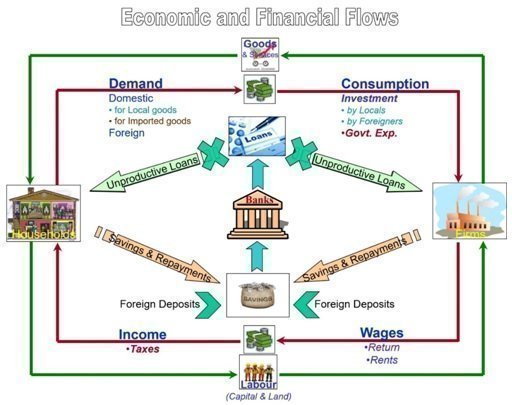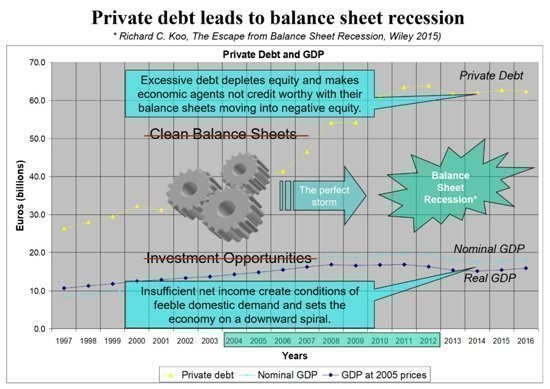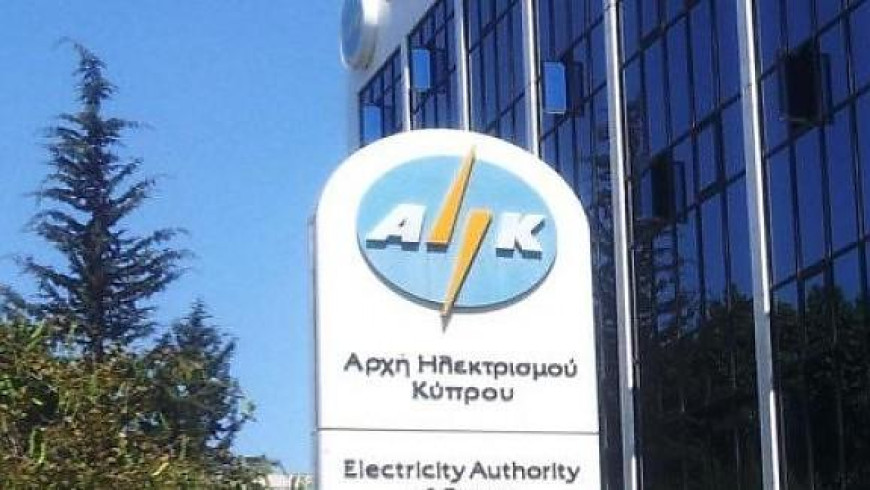The Advent of Zombie Banks

In an economy, like in Cyprus today, where its economic agents are so deeply in debt that it is hard for households and firms to make ends meet, let alone being able to service their existing loans, the only realistically possible objective for any remaining banks is to seek to maximise their return by employing the recourse available to them. This decodes into using all means possible to utilise or capture the collateral and guarantees of existing bad loans. For me, this is the definition of a zombie bank. It is one whose only mission is to “suck the blood” out of its wounded customers.
One may ask but why is this the only remaining purpose for such banks? The reason is simple. A bank cannot grant a sufficient amount of new productive loans with adequate repayment capability in a faltering economy where there are not many who can still be deemed credit worthy and where, partly as a result of this, there is only feeble domestic demand to allow for new investment opportunities. As illustrated in Figure 1, in conditions of excessive private debt, such as the ones that exist in Cyprus now, there are very few potential borrowers who remain credit worthy so that new loans can be extended to them. Moreover, because a large part of income has to be channelled towards repayments, domestic demand suffers which in turn, makes investment opportunities scarce and far between. In such situations, the bank is unable to channel back into the economy productively in the form of new viable loans the savings collected from repayments. This translates into a transfer of wealth from the people to the banks and inevitably brings about a recession.
Figure 1:the title is shown below. Put ‘Figure1’ next to it

Sustained development results from the productive use of financial and other resources to create real wealth. In Cyprus the very rapid growth of (is ‘household’ a better term?) debt and the increasingly wasteful use of financial resources has contributed importantly to calamitous events, the most recent being the financial crisis of 2012/2013 and the associated recession. Many studies for advanced economies provide evidence that the fast growth of private debt leads eventually to a marked slowdown in economic growth as diminishing returns set in from the use of abundant finance (see, for example, Mianand Sufi (2014), Hudson (2012) and Vague, Richard (2014)). Most notably Richard Koo coined the term ‘balance sheet recession’ to describe the recession that inevitably comes about from ignoring, as we now do in Cyprus, the problem of excessive private debt in an economy. As illustrated Figure 2, private debt weakens the two essential requirements necessary for an economy to grow and develop on a sustainable basis. The need for its economic agents to enjoy clean balance sheets and for having conditions that are conducive to viable investment opportunities in the real economy. This can create a perfect storm which, as Koo argues, results in a long and possibly deep balance sheet recession like the one Japan has experienced in the last few decades.
Figure 2:

The consequence of ignoring private debt and facilitating the narrowly perceived needs of the major “investors” is to create zombie banks like the ones we have in Cyprus. Given that these financial institutions are condemned to operate in an economy that is overwhelmed with debt, their main and practically only remaining purpose for existence becomes one of extracting as much as possible from the collaterals and guarantees they hold in their books. They have, therefore, transformed themselves from being providers of finance to asset management companies. The collaterals and guarantees which were acquired for many years prior to the 2013 crisis, when Cypriot banks were using the billions of deposits, they were receiving from abroad to extend mostly wasteful loans.The measure of success for the CEOs of these banks has thus become how efficiently the banks’ balance sheets are employed for the benefit of the sponsors and major shareholders, rather than what it is good for the lenders and the economy at large.
With the help of the country’s elected government these “vulture investors”come to bein total control of this parasitic endeavour. They influence and direct legislation behind the scenes to suit their needs and the government is, judging from the evidence so far, just happy to oblige. It is further a very sad development that, as it is now becoming apparent from the alleged cases of preferential treatment of relatives of the Supreme court to secure judgments for the banks, the judiciary, or part of it at least, seems to be also happy to oblige the zombie banks in their quest to enrich the few at the expense of the many.
Bibliography
- Mian, Atif. House of Debt: How They (and You) Caused the Great Recession, and How We Can Prevent It from Happening Again. University of Chicago Press. Kindle Edition.
- Koo, Richard C (2015) The Escape from Balance Sheet Recession and the Q.E. Trap, Wiley.
- Manison, Leslie and Savvides, Savvakis (2017) “Neglect private debt at the economy’s peril”, World Economics Journal, Vol. 18, No. 1, January–March 2017.
- Hudson, Michael (2012) “The Road to Debt Deflation, Debt Peonage, and Neo-feudalism”, Working Paper No. 708, Levy Economics Institute of Bard College.
- Vague, Richard (2014) The Next Economic Crisis: Why It’s Coming and How to Avoid It, University of Pennsylvania Press.
- Savvides, Savvakis (2016) Overcoming private debt (unblocking the loan burdened real economy in Cyprus), The Journal of Private Equity, Fall, Vol. 19, No. 4: pp. 51-59.
- Vague, Richard (2014) Government Debt Isn't the Problem—Private Debt Is, http://www.theatlantic.com/business/archive/2014/09/government-debt-isnt-the-problemprivate-debt-is/379865/, 9 Sept 2014.
Savvakis C. Savvides is an economist, specialising in economic development and project financing. He is a former senior manager at the Cyprus Development Bank and has been a regular visiting lecturer at Harvard University and currently at Queen’s University. Author page: http://ssrn.com/author=262460.







 3287.99
3287.99 1275.09
1275.09

